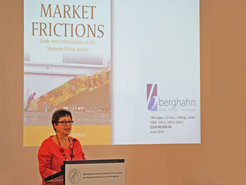Markets in Vietnam: New Book by Kirsten Endres
Kirsten Endres’ new book "Market Frictions: Trade and Urbanization at the Vietnam-China Border" will be published in June by Berghahn as the fifth volume in the series “Max Planck Studies in Anthropology and Economy”. Vietnam expert Kirsten Endres is Head of Research Group in the Department ‘Resilience and Transformation in Eurasia’ at the Max Planck Institute for Social Anthropology (MPI). We talked with her about her new book.

What is the topic of your book "Market Frictions"?
The book looks at a marketplace in a Vietnamese city near the Chinese border – it is a typical general goods market where all kinds of merchandise are sold, from rice cookers to handbags. For a number of years the Vietnamese government has been pursuing a programme to develop and modernize the networks of markets across the country, and this has affected “my” marketplace as well: in 2014 the old building was demolished and replaced with a new one, which gave rise to many tensions and frictions, as the title of my book suggests. But the new market building is not the only source of friction: it also emerges in the daily interactions between the vendors, in disputes with the local authorities, or in the contact with the “different” Chinese, from whom they obtain most of their wares.
What do you find particularly interesting about Vietnamese markets?
Marketplaces are very lively and dynamic places, where people come together and interact with each other. There is always something happening: two vendors get into an argument and begin cursing each other; a group of Chinese tourists get bamboozled; the police inspect a market stall and confiscate illegal goods. A lot can be learned from all of these incidents – about moral principles, about the ways “us” and “them” are defined, about what is expected from the state, or more generally about the relationship between the authorities and the population.
How long have you been studying this topic?
I started investigating markets after I joined the MPI in 2009. Before then, I had studied Vietnamese possession rituals, so the focus was more on the realm of the religious and spiritual. But even here, the “market” – that is, the market economy in a broad sense – played an important role, because the market, consumption, and religious practice are always linked in a dynamic interrelationship. Many of the spirit mediums with whom I spoke were also involved in trade – thus, it was really just a short step to turn my attention to the market in a more narrow sense.
How did the book come about?
The book resulted from my involvement in the research group ‘Traders, Markets, and the State in Vietnam’, which I headed from 2010 to 2015. I spent 8 months doing fieldwork in Lào Cai, from October 2010 to March 2011, and again in August and September 2012, and from then until 2016 I spent one to two weeks a year there in order to keep up to date with current developments, particularly during the period after the old building was torn down and before the vendors had moved into the new facilities.
What new insights does the book offer?
The book offers a deeper understanding of the ways that markets are shaped by the specific political and economic conditions, how they change and function. One notices parallels with developments in other parts of the world where urban development and modernization have also long had an influence on the nature of marketplaces.
For whom is the book likely to be of interest – who should read it?
The book is of course of particular interest to economic anthropologists and scholars of Southeast Asia, but beyond that, it is also relevant for anyone investigating processes of transformation in post-socialist or late socialist societies.
What are you working on now?
Currently I am head of a research group that is investigating electricity and renewable energy in the Mekong region. We are particularly interested in the connection between the expansion of power grids and the formation of modern state power in Vietnam, Laos, and South China. As part of this project I am researching the history of electrification in Vietnam during the French colonial period. An entirely different area of investigation – although it goes without saying that here, too, the “market” continues to play an important role!
